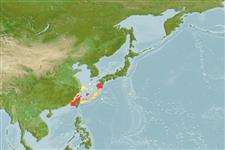Preferred temperature (Ref.
115969): 21.4 - 24.7, mean 22.7 (based on 26 cells).
Phylogenetic diversity index (Ref.
82804): PD
50 = 0.5312 [Uniqueness, from 0.5 = low to 2.0 = high].
Bayesian length-weight: a=0.02818 (0.01755 - 0.04527), b=2.94 (2.80 - 3.08), in cm Total Length, based on LWR estimates for this species & (Sub)family-body (Ref.
93245).
Trofisk nivå (Ref.
69278): 2.8 ±0.39 se; based on food items.
Resiliens (Ref.
120179): Mellan, lägsta populationsfördubblingstid 1,4-4,4 år (Assuming tm=2).
Fishing Vulnerability (Ref.
59153): Low vulnerability (20 of 100).
Climate Vulnerability (Ref.
125649): High to very high vulnerability (73 of 100).
